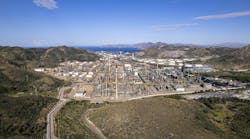National Petrochemical & Refiners Association Pres. Bob Slaughter disputed allegations that major oil company executives did not want to testify at a Feb. 1 Senate committee hearing on industry concentration and its possible impact on prices.
“As has been demonstrated many times in the past, the refining industry always stands ready to present information regarding the structure of our industry and the multiple factors that influence investment decisions and the energy market,” Slaughter said in a Jan. 31 statement.
“Unfortunately, in the case of the Feb. 1 hearing, some of the executive leadership of our industry was contacted with essentially 4 business days to go before the hearing. Given the demands of running some of America’s largest companies, it is no surprise that all schedules could not be accommodated on such short notice.”
Slaughter said the US downstream oil industry is very competitive with 54 refining companies, hundreds of marketers and wholesalers, and more than 165,000 retail outlets.
The biggest refiner accounts for only about 13% of the nation’s total refining capacity, and the large integrated companies own and operate only about 10% of the retail outlets, he said.
Citing data from the Department of Commerce and the consumer group Public Citizen, Slaughter said the four largest refiners controlled slightly more than 40% of total US oil processing capacity in 2003. That compared with 80-90% shares held by the top four companies in the automotive, brewing, tobacco, floor covering, and breakfast cereal industries.
US refining mergers and acquisitions also have maintained, and even increased, capacity in instances where it would not have been possible otherwise, the NPRA official said.
“One such example is Sunoco’s refinery complex in the metropolitan Philadelphia area, which now represents over 550,000 b/d of capacity. Lacking Sunoco’s ability to operate these facilities as a unit, this production might not be available for the consumers in the immediate area,” he said.
Slaughter said the acquisition of the Tosco refineries by Phillips Petroleum Co. (now ConocoPhillips) also assured that those plants added capacity and remained viable, while Valero Energy Corp. has increased the capacity of refineries it has acquired by nearly 400,000 b/d.
“The refining industry has a good story to tell,” Slaughter said. “It has invested billions of dollars in a business that has often had disappointing returns, and it recently has worked with others in industry and government to restore supplies after two hurricanes caused unprecedented damage to America’s gasoline and diesel supply system.”

